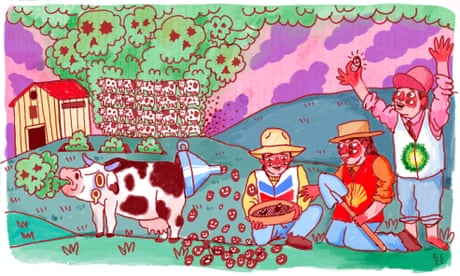- by foxnews
- 03 Feb 2025
Brown gold: the great American manure rush begins
Brown gold: the great American manure rush begins
- by theguardian
- 03 Feb 2023
- in news

But those emissions are also a potential moneymaker. Methane from animal waste can be purified into a product virtually indistinguishable from fossil fuel-based natural gas. Marketed as renewable natural gas (RNG), it has a unique profit-making edge: in addition to revenue from the sale of the gas itself, energy companies can now also earn handsome environmental subsidies for their role in keeping methane out of the atmosphere.
Cardoso was raised on a dairy farm in California but, growing up, had no idea about the potential of cow manure. She predicts that natural gas and dairy production will soon go hand in hand.
But some watchers of the biogas boom worry that monetizing avoided emissions could backfire. Environmental justice and animal welfare groups are campaigning against subsidies for the industry and raising questions about the challenges posed by digester technology. For one, digesters can and do leak. They also only mitigate about half of the methane problem posed by the dairy industry. While digesters capture emissions from manure, they do nothing to resolve the issue of emissions from cow burps, which, in California, produce roughly the same amount of methane emissions as manure.
But the heart of their concerns is the question about whether or not renewable natural gas generated from dairy farms is truly carbon negative. The answer depends on how you tell the story of its production.
The biggest winner under this system is RNG from dairy farms, which consistently receives not only the lowest carbon footprint scores across all fuel types, but also some of the only negative ones. Carbon-negative fuels are considered to remove greenhouse gases from the atmosphere.
This discrepancy is rooted in the assumption that manure is not produced deliberately; it is an inevitable byproduct of the dairy industry. So, the thinking goes, when energy companies intervene to capture methane and convert it into fuel, that process results in a net reduction in emissions.
But not everyone sees it this way. Some agricultural economists point out that existing climate policies have turned manure into a revenue source in and of itself, similar to cheese or butter. By giving manure its own inherent value, climate regulators have turned it from waste into a commodity.
Some climate researchers worry that incentives for methane capture have become so generous that they may increase manure production in the long run. Taken to an extreme, some worry dairy farms could end up turning into feces farms that happen to also produce dairy.
He found that revenue from methane capture alone could, in some cases, make up almost 40% of total profits for mid- and large-sized dairy farms in California. When revenue from methane capture begins to eclipse that from dairy production itself, the study warned, it could end up incentivizing farms to increase herd sizes to produce more manure.
Were California climate regulators to recognize manure as an intentionally produced material, like corn grown for ethanol, then its carbon intensity score would increase significantly to reflect everything from the greenhouse gases involved with producing feed to the emissions released from cow burps.
The sharply divided response underscored the ongoing tension that arises when climate solutions attempt to balance environmental benefits with industry bottom lines.
This story was reported with support from the UC Berkeley-11th Hour Food and Farming Journalism Fellowship
- by foxnews
- descember 09, 2016
Super Bowl 2025 flights, hotels see major price hike ahead of big game
Super Bowl LIX appears to be affecting flight costs and hotel accommodations as Kansas City Chiefs and Philadelphia Eagles fans head to New Orleans, Louisiana, for big game.
read more


